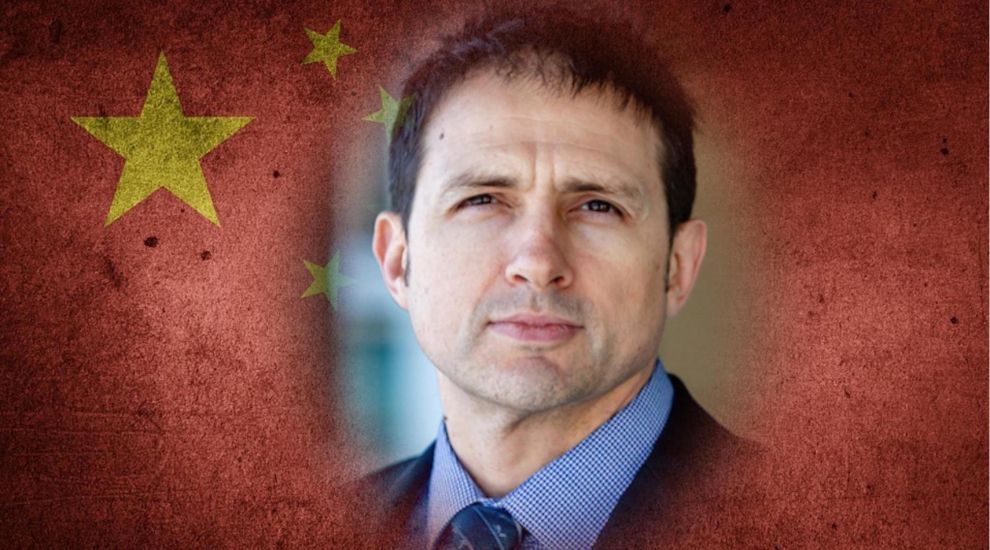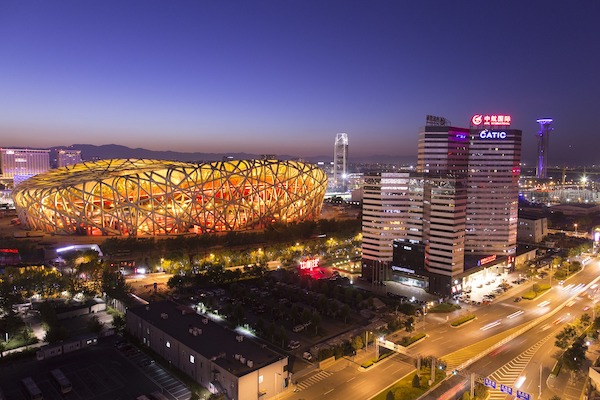

As more and more businesses look to Asia for new opportunities, Express spoke to the man using his cultural and Mandarin know-how to help others build bridges from East to West.
It is easy to fall into the trap of thinking that a business model or particular skill set is niche, simply because you haven’t come across it before.
So, if there are teeming hordes of Jersey folk out there being coy about their ability to speak and write Mandarin, and who are able to open up the Chinese manufacturing market for clients by applying a solid understanding of specific cultural norms, then you have Express' apologies for thinking that Richard Collett’s business, China Direct Consulting, is something of a one-off in the Jersey’s business world.
The easy definition of the consultancy is of a business which creates a business link between East and West. The need that drives that consultancy, and the requirement for Richard’s services, is just a bit more complex.

Pictured: Richard has recently returned to Jersey with his wife, Min Chen. (Gary Grimshaw)
Richard has recently returned to Jersey with his wife, Min Chen, and their children but has spent much of his career off the rock. Like many a Bean before him, he headed first for Australia, living and working in Sydney in digital brand marketing. When the gleam started wearing off, rather than coming home or heading somewhere else, he took the unusual step of going to technical college and learning Chinese in evening classes – it was the first step in a very different direction.
Somehow, he said, it became obvious in 2006 that the time was right to leave and the path that he took was to China and to Peking University where he immersed himself in an intense course of Chinese which didn’t allow for English speaking and had a “pretty regimental – in a good way” approach to learning. It was an approach which worked for him.
“The course massively improved my reading and I ended up working for a large China-based software out-sourcing company. It was a company of about 1,500 employees and I was the only foreigner there. It was useful for them because I could communicate in English for them on a business level,” he said.

Pictured: Richard immersed himself in an intense course of Chinese which didn’t allow for English speaking.
Richard’s first venture in this field, Our Man in Beijing, began when he made the decision to partner up with someone else with a similar ambition to smooth the way for Western organisations to do business in China. Together they had the contacts to enable business registration, the skills to market themselves effectively and at low cost on the internet, and could ride the wave that followed the 2008 Beijing Summer Olympics.
“That was how we grew, doing business in stronger economies than China, so that there was some value for them. They have heavy industry in place in various locations for factories to produce anything from plastics to ceramics and glass, and our clients can be anything from small companies to very big business.
“I was quite comfortable there and was having a lot of fun and working hard to get clients. I was starting a business fresh in an area where there was not a lot much competition.”

Pictured: With his first business, Our Man in Beijing, Richard, rode the wave of the 2008 Summer Olympics.
This early venture and the future success of the business seems to have been underpinned by two things. The first, which runs through everything that Richard said, is an affection and respect for China and its people and culture. The second was the insight that it gave him into how someone with his mix of language and skills could provide an extremely useful service in bridging gaps in understanding between Western and Chinese businesses to everyone’s benefit.
“Doing business in China can be very difficult unless you have lived there and understand the culture. The Chinese have a different mindset and patterns of behaviour which are the opposite of ours.”
This is not about exploiting markets but about having enough understanding for each party to enjoy the most effective business relationship that they can.
China is playing an increasingly important role in the global economy and, when it comes to factory production, there are major advantages to doing business with and in China. “There is an economic advantage to doing business in China. Costs are much lower so the profit margin is bigger. It is advantageous to have your product there, but the biggest problem is doing that on your own. Our clients understand that there is an added cost in using us but that it works.”

Pictured: “China has had a bad rap but the Chinese are lovely people," Richard says. (Gary Grimshaw)
Of course, part of the reason that China Direct Consulting and Our Man in Beijing exist is that doing business in China has not always been easy, and the unwary and unprepared have had bad experiences. “China has had a bad rap but the Chinese are lovely people. They are very funny, welcoming and relaxed and have got their own nuances. You are also left to get on with your own things as well and they don’t mind people doing what they want to do. They have a deep love of their culture, history and language.”
As always, there are many generalisations that you can make about any culture and the fact is that it won’t fit every individual but knowing the culture intimately means that you can see more rapidly where something is likely to land badly or without an understanding of the original intention.
A gesture which means one thing in the West can mean something completely different in Beijing and only someone who understands how that gesture plays out to both can really make sure that this doesn’t risk the relationship.

Pictured: "China is a special place for me," says Richard. (Gary Grimshaw)
The way that industry has grown up in China means that different industries are located in distinct regions and are linked with those areas. This regionality in production specialism is as much a legacy of the regime as the lack of managerial hierarchy which exists in structures which were set up on the basis of providing work and goods rather than driving a profit.
And this is one of the areas, said Richard where misunderstandings can occur, and so one where a trusted middle man who understands the culture and frustrations on both sides can smooth a business relationship.
“For me, essentially, it does not matter what products the factory is producing, there is a process that I can apply to every factory because they all have the same mindset and way of doing business because they have all come from the same schooling.”

Pictured: Min's input was an important aspect in the work of Our Man in Beijing and remains so with China Direct Consulting. (Gary Grimshaw)
Min’s input was an important aspect in the work of Our Man in Beijing and remains so with China Direct Consulting. She takes the lead on how businesses communicate factories to make sure that the right outcomes and targets are met to mutual benefit.
She, and the trusted staff on the ground in China make sure that the right contacts are in place to make sure that the work is done, and the right conversations are happening with the right people. And, importantly, they can help make the cultural translations needed to smooth out the ruckles and annoyance that can happen when nuances are misunderstood or are lost in translation.
“We continue to do this because we have a good client-base which is loyal, and we work well with. It is also rewarding and enjoyable when a client’s production is finished, and they receive their goods and are happy with the result – to have developed a product from drawings to first production and through the design process to being marketed is pretty cool.”
“I like managing projects and this gives me the opportunity to do that. I like promoting China and finding the correct partner for our clients and helping cross-cultural development. We have built up relationships and a loyalty that means we have a good service and provide good deals for clients.”
As it turns out, it is not unreasonable to assume that Min and Richard are filling a particular niche in the Western – and particularly now Jersey – market place. Even if he says so himself: “China is a special place for me and it is not the case that there are lots of companies like ours.”
Comments
Comments on this story express the views of the commentator only, not Bailiwick Publishing. We are unable to guarantee the accuracy of any of those comments.